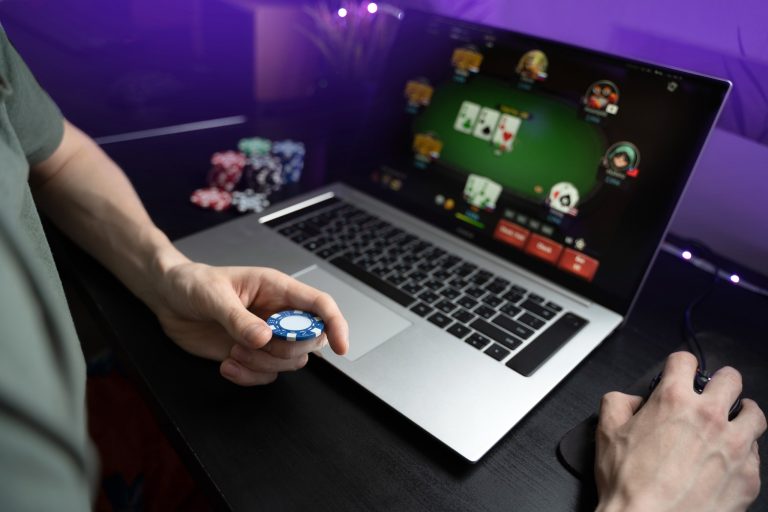
Some of the most important things a poker or ポーカー 語 player can do to improve their skills and win more often are to learn advanced methods. Even though you need to know the basics of the game, it’s the more advanced strategies that set great players apart from average ones. Some of these advanced techniques are learning how to bluff, knowing the ranges of different hands, using advanced bet sizing strategies, and using psychological tricks to trick your opponents.
By using advanced methods in their poker strategy, players can get a better sense of their opponents, make better choices, and eventually improve their chances of winning. In both live poker games and online tournaments, knowing how to use advanced strategies can help players win.
Chances of Success in Poker
In poker, knowing the numbers and probabilities is important for figuring out how likely you are to win any given hand or game. This means figuring out how likely it is that certain cards or combos will show up and then using that knowledge to make smart choices.
To figure out the odds in poker, you need to know how many cards are in the deck, how many cards you need to make a hand, and how many cards you don’t know. In this case, if you have a flush draw after the flop, out of the 47 cards that are still in the deck, 9 are unknown and could finish your flush. This means that there is a 19% chance that you will get your flush on the turn.
When you’re in a game, knowing the odds of winning can help you decide when to be more bold and when to be more careful. This means thinking about things like the number of chips you have, the blinds, and the payouts. Knowing about percentages and odds can help you figure out how likely you are to win and help you make better poker decisions.
Making Informed Decisions
To make smart choices at the poker table, you need to collect and analyze information. Through watching the actions, body language, and betting habits of other players, a player can learn a lot about how strong their opponents’ hands are. When you use player reads and tells, you can make better choices about whether to bet, call, raise, or fold.
For instance, if a player sees that a certain opponent only raises when they have a strong hand, they can use that information to help them decide whether to keep playing or fold. In the same way, if a player sees that an opponent is nervous or uncomfortable, they may be able to figure out that the opponent is weak and use this to their advantage.
People who play poker can get better at reading their opponents and figuring out how strong their hands are by collecting and studying information at the table. This lets you make decisions with more strategy and thought, which increases your chances of winning the game.
Analyzing Betting Patterns
In poker, it’s important to be able to look at betting trends to figure out how strong your opponents’ hands are. A player can learn more about their opponent’s betting habits and possible hand ranges by paying close attention to how they bet in different scenarios. To give you an example, if a player always bets big when they have good hands and small when they are bluffing, you can use this knowledge to help you decide whether to call, raise, or fold.
It’s important to be aware of and change your own betting habits as well as finding patterns in how your opponents bet. Changes in bet size, time, and frequency can help a player stay ahead strategically by keeping their opponents guessing. For example, making small bets that look like good hands and playing with bigger bets can make it hard for opponents to figure out what your hand is.
Overall, one of the most important parts of winning at poker is looking at and changing your spending habits. You need to be able to carefully observe, know a lot about game theory, and be able to change your strategy based on what you learn. Poker players can get a big advantage over their opponents and improve their chances of winning if they learn this skill.
Strategies for Experienced Players
If you want to be a good player, you should use advanced techniques like bluffing, semi-bluffing, and slow-playing. Bluffing is when you bet or raise aggressively when you don’t have a good hand to make your opponents think you do. If used rarely and in the right conditions, this high-risk, high-reward strategy can work very well. Not so with semi-bluffing. This means betting or raising with a drawing hand that might get better to a good hand on a later turn. This puts pressure on your opponents and gives you a chance to win the pot right away or with the best hand if your draw works out.
Slow-playing, also known as trapping, is the opposite of faking. It means playing down a strong hand to hide how strong it is and get more value from your opponents later in the hand. To use these advanced techniques, you need to know a lot about your opponents’ habits and be able to figure out what cards they are holding by watching how they play.
Along with these advanced strategies, it’s also important to know the odds of the pot in order to make smart decisions that will pay off. By comparing the size of the bet you need to call to the size of the pot, you can figure out if it’s mathematically right to keep playing based on how likely it is that your hand will get better and how much you could win.
When you use these advanced methods and ideas in your game, you can take it to the next level and score big wins over your opponents.
Emotional Control and Psychological Warfare
To win at poker, you need to be able to control your emotions. When making decisions, it’s important to keep your cool and not let irritation, joy, or anger cloud your judgment. Emotional control helps players make smart, long-term choices without letting short-term feelings get in the way. This is very important in a game where you have to read your opponents and take measured chances to win.
In addition to being able to control your emotions, knowing how to use psychological warfare can give you an edge at the poker table. To get an edge, this means controlling your opponents’ feelings and thoughts. One strategy is to stay cool and unreadable, which makes it hard for your opponents to figure out how you’re feeling and what you’re going to do next. You can also use what you learn about other players’ feelings and tells to your advantage by watching and picking up on them.
To throw people off their game in psychological warfare, you can also bluff and scare them. If players get good at these strategies, they can mess with other players’ mental control and win the game. Emotional control and psychological warfare go hand in hand in the end, and when used correctly, they can have a big effect on how well a poker player does.
Bankroll Management and Game Selection
It’s important to know how to handle your money if you want to keep gambling, whether you’re in a casino or online. The best way to make sure you can keep playing and have a chance to win in the long run is to handle your money well. You should decide how much you are ready to risk and then stick to that amount so you don’t lose a lot of money.
Only risk a small part of your total cash on each bet or game is one way to keep track of it. This makes it less likely that you’ll lose everything at once. Game choosing is another important part of managing your cash. To make the most money, it’s important to pick games with a low house edge. If you want to make the most money, you should play games like blackjack or poker where skill is important.
You can also improve your chances of winning by learning the rules and methods of the games you like to play. Finally, it’s important to know when to stop looking for losses and when to walk away. By practicing proper bankroll management and smart game selection, you can increase your longevity in the gambling world and have a better chance of coming out ahead in the long run.

Conclusion
In conclusion, ポーカー 語 is a game that rewards dedication and skill, and there is always room for improvement. By continuously practicing and honing advanced poker skills, you can elevate your game to the next level and increase your chances of success. Whether it’s mastering the art of bluffing, perfecting your reading of opponents, or refining your strategic gameplay, the effort you put into advancing your poker skills will undoubtedly pay off in the long run. Remember, even the most seasoned professionals never stop learning and evolving in the game of ポーカー, and success often comes to those who are willing to put in the time and effort. So, keep pushing yourself, stay disciplined, and always strive to sharpen your skills and knowledge of the game. With dedication and perseverance, you can become a formidable force in the world of ポーカー and achieve the success you desire. Keep learning, keep growing, and keep improving – the results will speak for themselves. Your journey to mastery in ポーカー is an ongoing process, and the rewards for your commitment will be well worth the effort.





